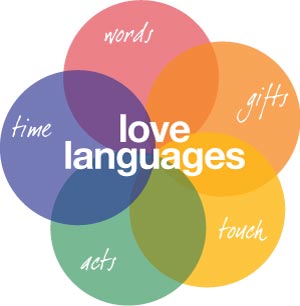 Communication is the key to maintaining a healthy relationship. Communicating with your significant other requires both listening and expressing your thoughts and desires.
Communication is the key to maintaining a healthy relationship. Communicating with your significant other requires both listening and expressing your thoughts and desires.
Gary Chapmans’ book, The 5 Love Languages, suggests that there are 5 ways that we SHOW and RECEIVE love. His languages are: gifts, quality time, words of affirmation, acts of service, and physical touch. Chapman explains that it is important to learn the ways in which you like to show those that matter most that you love and appreciate them, as well as how you like to receive love from others.
Here are Gary Chapman’s 5 Love Languages:
Words of Affirmation
Hearing the words, “I Love You,” are important, but hearing the reasons on why someone loves you are just as important. Words of appreciation, encouraging works, and kind words are a powerful communication of love. Verbally communicating your love must be done with a humble heart, kindness, tenderness and sincerity.
Quality Time
Nothing says “I love you, like giving your beloved your undivided attention. A person who loves through quality time, or needs to be loved with quality time need that one on one time, with no TV, cell phone on vibrate, no outside influences, just one on one time. Quality time is not just being at the same place at the same time. It involved interaction and sharing the time together. Maintaining eye contact, no multi-tasking, and actively participating in the conversation are a must for the QT lover.
Gifting
Gifting should not be confused with materialism. Receiving gifts as a form of love focuses on the thoughtfulness and effort behind the gift, and vice versa for the gifter who shows love through gifting. The gifter is expressing that their sweetheart is cared for and prized for above whatever was sacrificed to bring the gift. The one showing their love through gift giving often goes through a great deal of thought and planning in an effort to provide the perfect gift at the most appropriate time.
Acts of Service
Showing love through acts of service display the devotion that one has towards their object of affection. Attempting to ease their workload and make their life easier bring pleasure to the acts of service lover. Actions such as housework, cooking meals, laundry, yard work, running errands, dealing with finances are just a few examples of acts of service one might perform to show their love and devotion. These acts, no matter how big or small, require thought, planning and effort. For the loved one who likes to receive love through acts of service, they see them as a display of love and commitment.
Physical Touch
Don’t confuse this love language as just related to sex. Physical touch can be hugs, pats on the back, hand holding, caressing as you pass each other, and kissing when you leave or return to the home. These small acts of affection build excitement and display loving and caring. Love touches don’t take much time and the holding hands, kissing, hugging, touching each other when you leave the house and when you return may involve only a brief kiss, but speaks volumes.
The Importance To Learn Your Love Language
If we use this model of showing and receiving love, it is important to have a healthy relationship to understand two things:
- How you like to receive and show love
- How your significant other likes to receive and show love.
Knowing your bent for showing and receiving love, and fully understanding the way your significant other shows and receive love will bring a new level to your relationship. Understand that you may or may not match up with your mate. It may take work on both parts to understand these new concepts of showing and receiving each other’s affection.
How To Communicate Your Love Language
In many relationships, the concept of love languages is foreign. Opening the lines of communication between you and your partner will allow you both to express your thoughts, observations and desires to each other without being criticized. The goal is to build a deeper and long lasting relationship while enjoying each other’s characteristics that you bring to the relationship.
Gary Chapman does offer an assessment: http://www.5lovelanguages.com/profile/couples/
This is a great tool that you and your partner can take and learn the best ways to communicate love and build a lasting relationship.
